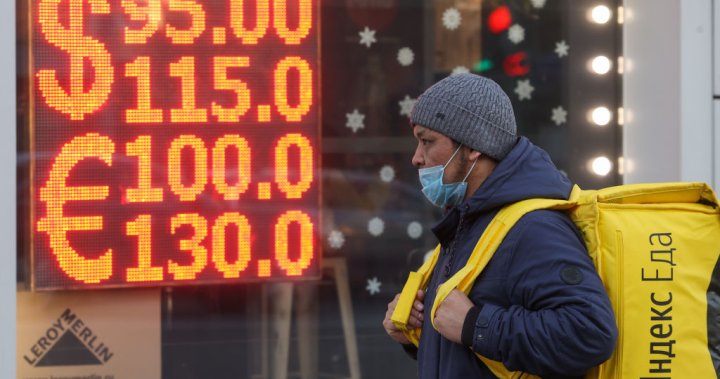Cryptocurrency a ‘double-edged sword’ in Ukraine-Russia war, experts say – National | Globalnews.ca
Cryptocurrency has emerged as a “double-edged sword” in the war between Russia and Ukraine, but experts say it’s more likely to support citizens on both sides of the conflict than help oligarchs and other officials skirt economic sanctions.
The invasion of Ukraine, now stretching into its second week, has spawned western sanctions directed at Russian President Vladimir Putin, his allies and the country’s financial system.
The results have seen the Russian ruble plummet to all-time lows against the U.S. dollar and severe limitations on where the country’s regular citizens and richest oligarchs can move and access their money.
Read more:
Russian oligarchs’ yachts seized in Europe, others moved to Maldives

But as the ruble dropped last week, Russian activity in the cryptocurrency space took off.
Trading volumes between the ruble and cryptocurrencies hit 15.3 billion rubles (US$140.7 million) on Monday, a three-fold jump from a week earlier, according to researcher CryptoCompare.
The decentralized nature of cryptocurrencies like Bitcoin has prompted some concerns that the digital assets could be used to skirt sanctions or, at minimum, blunt the effectiveness of the western economic penalties on Russia.
Mykhailo Fedorov, Ukraine’s vice-prime minister and minster of digital transformation, sent a tweet last week calling on all crypto exchanges to cease trading with Russian accounts, citizens and oligarchs alike.
That prompted backlash from some major exchanges such as Binance and Kraken, which indicated that while they would comply with sanctions on accounts tied to restricted individuals, they wouldn’t issue blanket bans on transactions across the Russian population.
Crypto likely won’t blunt impact of sanctions
But experts are also arguing that concerns over cryptocurrency’s ability to subvert economic sanctions are likely overblown.
For one, the scale of the West’s sanctions against Russia and its oligarchs is too great for Bitcoin or other cryptocurrencies to fully absorb, says Andreas Park, a professor of finance at the University of Toronto.
The system simply isn’t liquid enough to offset the normal volume of trade that flows across Russia’s now heavily sanctioned banking system.

“Now, Bitcoin has a significant market cap, but the amount … cryptocurrencies that are in circulation that could be used for this is significantly, by many orders of magnitude, too small,” Park tells Global News.
“So to think that you can use cryptocurrencies as a way to blunt the effect, that’s simply not possible.”
Park says it’s also a misconception that crypto isn’t traceable or subject to government regulations.
While the crypto sector can be described as “pseudo anonymous,” transactions are permanently recorded on the blockchain, and Park says forensic accountants have gotten pretty good at following the money through various conversions in the chain.
When it comes time to convert crypto into a more usable fiat currency, regulators are usually ready to pounce on those funds as they’re being withdrawn at an exchange, typically seen as an “on/off-ramp.”
“So in other words, if Putin were to use Bitcoin as a means to circumvent sanctions by sending money around, there’s always the possibility that you can catch him on the way in and out,” Park says.
Read more:
Freezing ‘freedom convoy’ crypto possible, but faces roadblocks, experts say
Brian Mosoff, CEO of Toronto-based crypto investment platform Ether Capital, says the industry is at a turning point where how to handle sanctions and other global attempts at regulation will become increasingly clear.
It’s in crypto exchanges’ best interest to be compliant with those sanctions as the industry moves towards international and mainstream legitimacy, he says.
“The future of cryptocurrency is absolutely at stake here. You are seeing that something that had been marginalized and pushed aside for the first 13 years of its existence is now part of a global conversation,” Mosoff says.
“That clarity will come in the next three months, six months, 12 months. And from what I know from all of these platforms, they are looking to be compliant.”
Crypto a way to ‘rally’ around Ukraine, useful on the ground
Cryptocurrencies have also become a rallying point for Ukraine’s resistance to Russian attacks and for civilians fleeing the conflict.
More than US$54 million worth of Bitcoin and Ethereum have so far been donated to the Ukraine government and an NGO providing support to the country’s military since the war began, according to crypto tracking site Elliptic.
Mosoff says cryptocurrency is becoming a way for people around the world to “rally” around Ukraine from afar, but also notes it’s becoming a key channel on the ground for Ukrainians in need of support or fleeing the country.

Because crypto is borderless and decentralized, personal Bitcoin or Ethereum wallets can be accessed from anywhere as long as the owner has their private key on hand.
For refugees and others uncertain of what port they might end up in, crypto can be a flexible option to ensure they can convert their funds into something useful for any other jurisdiction, Mosoff says.
Park notes crypto is also a safeguard against a possible Russian takeover of Ukraine’s financial system. Relatives or friends trying to get money to their loved ones in Ukraine could have that funding essentially intercepted if the country’s banks fall under Russian control, he says, while private crypto wallets cannot be compromised from a centralized institution.
“That money cannot be taken away from you. So clearly, this is a very, very useful and in many ways, secure, mechanism to support Ukrainian friends,” Park says.
Russian citizens rely on crypto as well
An analysis from the Bankless Times shows that daily trading volume between Bitcoin and the Ukrainian hryvnia spiked 270 per cent on Feb. 24, the first day of Russia’s invasion of the country. That analysis also showed a jump of 271 per cent in Bitcoin-ruble trading volumes the same day.
Park says that as important as crypto is proving to be to the people of Ukraine, Russian citizens are turning to the technology as well as they attempt to maintain their connections to the global financial system.
That banking cutoff can cripple Russian families who rely on payments from relatives in the United States or Canada, he argues.
“If it’s impossible for Russian banks to participate in the global payments network, then they can’t get money from their relatives either,” Park says.
Speaking to reporters Thursday about the ramifications of the West’s sanctions on Russia, Prime Minister Justin Trudeau acknowledged that the economic penalties will not land solely at the feet of Putin and his allies, calling the war “a terrible mistake for which he and the Russian people will pay.”
Read more:
Russian, Belarusian truckers speak of fears over Ukraine war — ‘It should be ended’
Though some may view crypto transactions to ordinary Russians as subverting the goal of western sanctions, Park argues that the technology has become a necessary conduit for people who had nothing to do with declaring a war on Ukraine.
“With cryptocurrencies, it’s a double-edged sword, so they can be used for good and you can use for bad,” he says. “This is one way how people want to continue helping them … this is not a bad thing.”
If anyone is angered by the way cryptocurrency is being used on any side of the Russia-Ukraine conflict, Mosoff says there will always be use cases for technology that people agree with and don’t, but he argues those judgments should not land on the product itself.
“A few weeks ago, crypto was under fire about being used potentially as a donation tool to the ‘Freedom Convoy.’ And people may not have been in support of that, and now they’re very in support of these donations going to the Ukrainian people and the government,” he says.
“And so it illustrates that this is a tool that’s going to be used for things you support, things that you may be against, but that the technology itself is politically neutral.”
— with files from Reuters
© 2022 Global News, a division of Corus Entertainment Inc.
For all the latest Technology News Click Here




